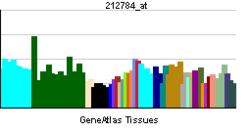CIC (gene)
Protein capicua homolog is a protein that in humans is encoded by the CIC gene.[3][4][5]
References
- ↑ "Human PubMed Reference:".
- ↑ "Mouse PubMed Reference:".
- ↑ Lee CJ, Chan WI, Cheung M, Cheng YC, Appleby VJ, Orme AT, Scotting PJ (Oct 2002). "CIC, a member of a novel subfamily of the HMG-box superfamily, is transiently expressed in developing granule neurons". Brain Res Mol Brain Res. 106 (1–2): 151–6. doi:10.1016/S0169-328X(02)00439-4. PMID 12393275.
- ↑ Lee CJ, Chan WI, Scotting PJ (Jun 2005). "CIC, a gene involved in cerebellar development and ErbB signaling, is significantly expressed in medulloblastomas". J Neurooncol. 73 (2): 101–8. doi:10.1007/s11060-004-4598-2. PMID 15981098.
- ↑ "Entrez Gene: CIC capicua transcriptional repressor [ Homo sapiens (human) ]".
Further reading
- Olsen JV, Blagoev B, Gnad F, et al. (2006). "Global, in vivo, and site-specific phosphorylation dynamics in signaling networks". Cell. 127 (3): 635–48. doi:10.1016/j.cell.2006.09.026. PMID 17081983.
- Lim J, Hao T, Shaw C, et al. (2006). "A protein-protein interaction network for human inherited ataxias and disorders of Purkinje cell degeneration". Cell. 125 (4): 801–14. doi:10.1016/j.cell.2006.03.032. PMID 16713569.
- Ballif BA, Villén J, Beausoleil SA, et al. (2005). "Phosphoproteomic analysis of the developing mouse brain". Mol. Cell Proteomics. 3 (11): 1093–101. doi:10.1074/mcp.M400085-MCP200. PMID 15345747.
- Beausoleil SA, Jedrychowski M, Schwartz D, et al. (2004). "Large-scale characterization of HeLa cell nuclear phosphoproteins". Proc. Natl. Acad. Sci. U.S.A. 101 (33): 12130–5. doi:10.1073/pnas.0404720101. PMC 514446
 . PMID 15302935.
. PMID 15302935.
- Grimwood J, Gordon LA, Olsen A, et al. (2004). "The DNA sequence and biology of human chromosome 19". Nature. 428 (6982): 529–35. doi:10.1038/nature02399. PMID 15057824.
- Nagase T, Ishikawa K, Nakajima D, et al. (1997). "Prediction of the coding sequences of unidentified human genes. VII. The complete sequences of 100 new cDNA clones from brain which can code for large proteins in vitro". DNA Res. 4 (2): 141–50. doi:10.1093/dnares/4.2.141. PMID 9205841.

 . PMID 15302935.
. PMID 15302935.